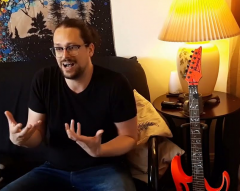First-Year Seminars (FYSM) 2025-26
First-year Seminar (FYSM) courses are smaller classes (with a maximum of 30 students) designed to give students the unique opportunity to discuss and research topics of interest in a core subject area.
While most university students have to wait until their third or fourth year of study before having the chance to participate in a more intimate seminar setting, as a Carleton University Bachelor of Arts student, the engaging seminar experience is available to you at the first-year level.
Fall 2025

FYSM 1210A: “Minds and Machines” [0.5 credit]
Instructor: Prof. Joshua Redstone
Fall Term
Have you ever wondered what the mind is? Have you ever asked yourself: “Is my mind something immaterial and mysterious, like a soul or a spirit? Or is my mind just a very complex machine, like a computer?” If you have, then you’re not alone – philosophers have pondered the nature of the mind since antiquity. Ancient thinkers like Plato and Aristotle argued that thinking is a function of the rational soul. More recently, philosophers began to explore another possibility. They wondered whether the human being – and by extension, the mind – is a kind of natural machine. In this seminar, you will gain an understanding of the mind by considering classic philosophical works on the nature of minds, machines, and souls.
Our inquiry will start by examining ancient conceptions of the soul: an immaterial entity that is essentially you. We will then proceed to read the work of some modern materialist thinkers like Thomas Hobbes, Julien Offray de la Mettrie, and T.H. Huxley, who argued that the human being – and by extension the mind – is just a natural machine. We will also encounter thinkers whose position lies between these two, like René Descartes, who believed the body was an intricate machine controlled by the soul. As our survey reaches the 20th century, we will examine the works of figures like Alan Turing, Hilary Putnam, John Searle, and others who approached the mind with the tools of philosophy in addition to those of computer science, neuroscience, and psychology. Throughout the seminar, questions intimately tied to the discussion about minds and machines will punctuate our search: can machines have free will? Is consciousness necessary for agency? What is special about artificial intelligence?
Winter 2026

FYSM 1210B: “Consciousness” [0.5 credit]
Instructor: Prof. Joshua Redstone
Winter Term
What is consciousness? On the one hand, consciousness is familiar to all of us since we are conscious beings. On the other hand, consciousness is one of the most intriguing and perplexing phenomena in the known universe! In the words of philosopher Daniel Dennett, “Human consciousness is just about the last surviving mystery. A mystery is a phenomenon that people don’t know how to think about—yet.” So, how have philosophers answered the question: what is consciousness? Over the coming weeks, you’ll gain an appreciation of some of the answers to this question by surveying the interdisciplinary field of consciousness studies.
Our learning journey will begin with a look at why consciousness is such a perplexing topic. We’ll examine whether consciousness represents something truly mysterious, or whether we can understand how conscious experience works with the tools of philosophy and the cognitive sciences like psychology, neuroscience, and computer science. As we proceed, we’ll learn about various theories of consciousness, our conscious experiences of the world and of the self, and the relationship between subjective conscious experience and physical events in the brain. We’ll also learn about the unconscious mind, agency and free will, altered states of consciousness, the evolution of consciousness, and whether artificial consciousness is possible. Along the way, you will have the opportunity to develop your reading, writing and critical thinking skills, and to engage in some very interesting thought experiments!